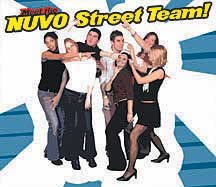The outgoing editor, Jim Harper, told the St. Petersburg Times that Weekly Planet president and CEO Ben Eason "wants a different kind of editor" and is conducting a nationwide search. Harper will retain his post during the hunt for his replacement. He has been the Planet's editor for 15 months. Before that, he worked for more than 20 years at the Times.
The Louisville, Kentucky, weekly was among four publications banned from Kroger, three of them for having sexually suggestive content (in LEO's case, apparently, its adult ads). But what about the sexual content of Cosmopolitan, which is still on the racks, asks executive editor and founder John Yarmuth. He argues that the selective banning constitutes censorship. In an accompanying article, Tom Peterson interviews public relations professionals about Kroger's strategy.
To commemorate the 50th anniversary of the Supreme Court decision abolishing segregation in public schools, Gambit Weekly asked New Orleans high school students to write about the ruling's impact on them. Segregation takes many forms, the students observe. Ninth grader Vinnessia Shelbia contends that the school system, by focusing on black "high achievers," belittles African American students' futures. The result: too many "end up cleaning up after the ones who went to good schools."
Two weeks after it refused to continue carrying a church newspaper, Kroger is removing three other weekly papers from its free distribution racks. Louisville, Kentucky's alternative weekly, LEO, is among the banned. A Kroger spokesman told reporter Peter Smith of The Courier-Journal that the store's biggest issue with some of the publications was "the sexual nature of much of the advertising they contain." John Yarmuth, LEO's founder and executive editor, calls the ban "a horrible business decision."
Each day tobacco accounts for the deaths of roughly 1,200 Americans, making it a bigger killer than alcohol, AIDS, car crashes, illegal drugs, murders and suicides combined. At the same time, the American Legacy Foundation, the group charged with educating the public about the dangers of smoking, is seeing its annual budget shrink by $20-$25 million each year, Seth McM. Donlin reports in Boston's Weekly Dig. That's because independent cigarette brands are gaining market share, diminishing the total the big four tobacco companies must pay to fund an anti-smoking campaign under the 1998 tobacco settlement with 46 states.
Doug Vanderlaan, of Jacksonville, Fla., didn't like what he was hearing on the Bubba the Love Sponge radio show. For two years he waged a campaign to get Bubba and all his lewd talk off the air, Jane Akre reports in Orlando Weekly. The result: Bubba was fired, his station (owned by Clear Channel) was hit with the largest fine in Federal Communications Commission history, and Clear Channel got on its knees before Congress.
Sometimes word of mouth is a more effective way of promoting a paper than a print ad. That's why some alternative newsweeklies send street teams out to bars, movie theaters and cultural events to hand out freebies and stir up interest in their papers. When they dispatch their street teams to public places, alt-weeklies like NUVO and Boston's Weekly Dig are relying on a centuries-old marketing technique the music industry revived.
- Go to the previous page
- 1
- …
- 124
- 125
- 126
- 127
- 128
- 129
- 130
- …
- 151
- Go to the next page

